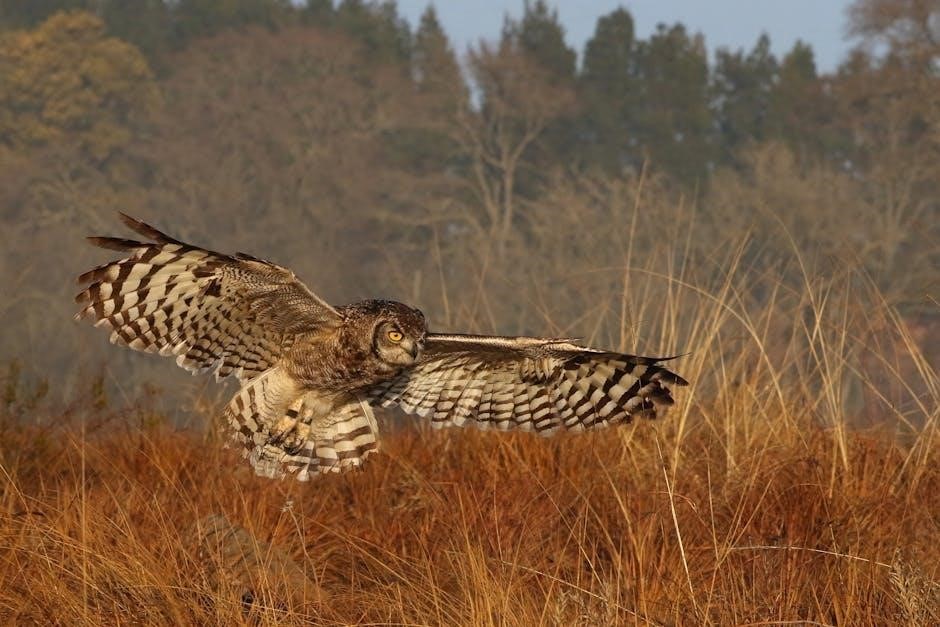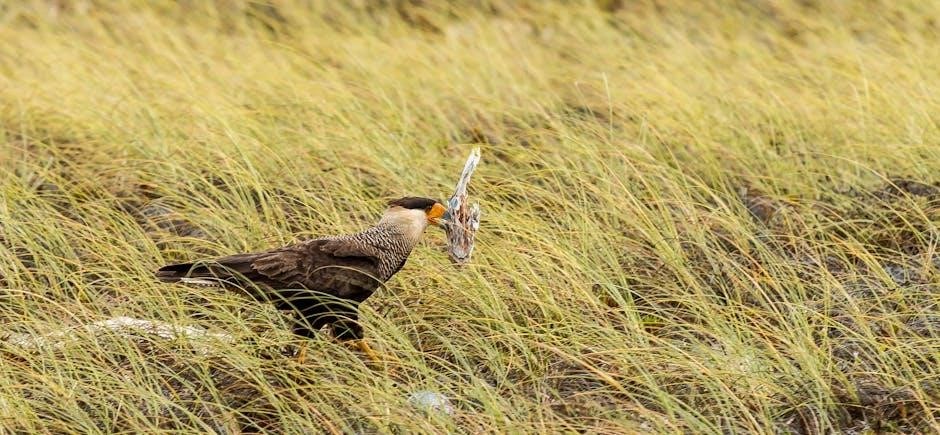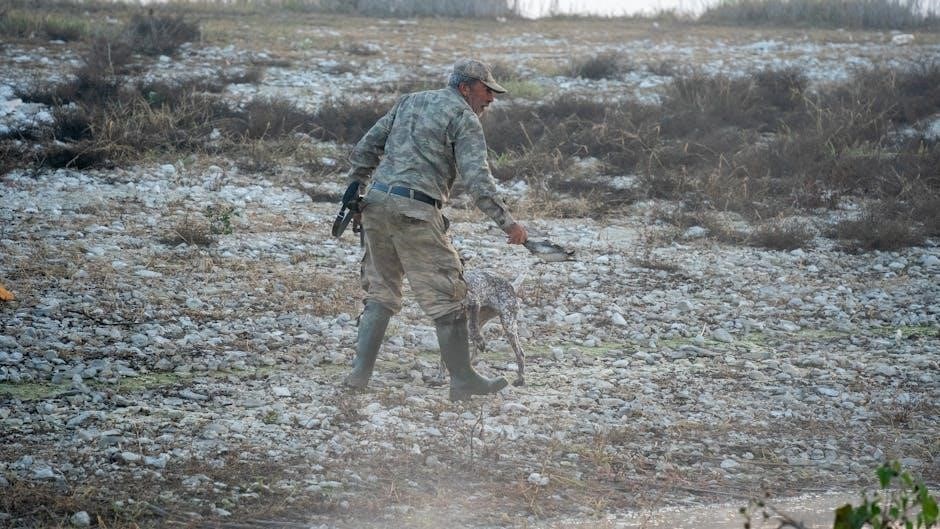Becoming a hunting guide requires passion, skills, and dedication. It involves leading clients safely and successfully, ensuring memorable hunting experiences. This role demands extensive knowledge of wildlife, terrain, and regulations, as well as strong communication and teaching abilities. A guide must be physically fit and prepared for challenges. This introduction outlines the key steps and qualities needed to excel in this rewarding yet demanding profession.
1.1 Understanding the Role of a Hunting Guide
A hunting guide is responsible for ensuring safe and successful hunting experiences for clients. This involves leading excursions, providing expert knowledge on wildlife, terrain, and regulations, and teaching essential skills. Guides must be physically fit and possess excellent communication skills to instruct and assist clients effectively. Their role also includes managing safety, handling emergencies, and ensuring ethical hunting practices. This position requires a deep understanding of nature and the ability to adapt to various situations, making it both challenging and rewarding.
1.2 Importance of Expertise and Knowledge
Expertise and knowledge are fundamental for a hunting guide. They must possess a deep understanding of wildlife behavior, terrain, and regulations. Guides need practical hunting skills, such as tracking and navigation, to ensure successful and safe excursions. Additionally, they must stay updated on new techniques and safety measures, continually developing their skills to provide high-quality experiences for clients. This comprehensive understanding is essential for building trust and ensuring memorable hunts.
Licensing and Certification Requirements
Obtaining a valid hunting license is essential. Certification, while not always required, enhances credibility. Consider enrolling in a guide school to gain specialized knowledge and skills.
2.1 Obtaining a Valid Hunting License
Obtaining a valid hunting license is the first step to becoming a hunting guide. Ensure you meet state-specific requirements, which often include completing a hunter safety course and passing a written test. This license demonstrates your understanding of hunting laws and ethics, making it essential for legally guiding hunts. Remember to stay updated on renewal requirements to maintain your credentials.
2.2 Enrolling in a Guide School
Enrolling in a guide school is crucial for refining your hunting and guiding skills. These programs cover essential topics like game care, ethical practices, and client management. They also emphasize teaching and safety skills, preparing you to lead hunts professionally. Guide schools vary in cost, but expect to invest at least $2,000. This training equips you with the knowledge and confidence needed to succeed as a hunting guide.
Developing Essential Skills
Developing essential skills involves enhancing hunting expertise, outdoor knowledge, and communication abilities. Guides must master tracking, navigation, and safety protocols while ensuring effective client interaction and teaching.
3.1 Enhancing Hunting and Outdoor Skills
Enhancing hunting and outdoor skills is crucial for a successful guide. This involves mastering game tracking, understanding animal behavior, and improving marksmanship. Guides must also develop expertise in wilderness survival, navigation, and terrain knowledge. Additionally, proficiency in setting up camps and handling equipment ensures a smooth experience for clients. These skills are honed through practice, mentorship, and hands-on experience.
3.2 Improving Communication and Teaching Abilities
Effective communication and teaching skills are vital for a hunting guide. Guides must clearly explain strategies, ensuring clients understand and execute plans. Patience is essential, especially with novice hunters. Developing strong interpersonal skills helps build trust and ensures a positive experience. Active listening and adaptability in communication style further enhance client interactions, making the guide more effective in teaching and leading successful hunts.

Understanding Local Regulations
Understanding local regulations is crucial for compliance with hunting laws, permits, and seasonal restrictions. Non-compliance can lead to legal penalties, damaging your reputation and client trust.
4.1 Familiarizing Yourself with Hunting Laws
Familiarizing yourself with hunting laws is essential for compliance and ethical guiding. These laws include permits, bag limits, and protected species. Understanding these regulations ensures legal and safe hunting practices, avoiding penalties. Staying informed about updates is crucial, as laws change seasonally. Knowledge of local, state, and federal regulations builds credibility and trust with clients, ensuring a safe and successful hunting experience for everyone involved.
4.2 Staying Updated on Seasonal Restrictions
Staying updated on seasonal restrictions is vital for legal and ethical hunting practices. Hunting seasons, bag limits, and gear restrictions vary by region and species. Guides must regularly check local wildlife agency updates to ensure compliance. Adhering to these rules prevents penalties and ensures a safe, legal experience for clients. Seasonal changes require adaptability and attention to detail to maintain professionalism and trust in your guiding services.

Building a Hunting Guide Business
Building a hunting guide business requires a comprehensive plan, including target markets, pricing, and marketing strategies. A well-structured plan ensures long-term success and financial stability.
5.1 Creating a Comprehensive Business Plan
A detailed business plan is crucial for a successful hunting guide service. It should outline target markets, pricing structures, and marketing strategies. Financial projections and operational logistics are also essential. This plan guides decision-making and helps secure funding. A clear vision and objectives ensure the business remains focused and adaptable in a competitive market. Regular updates keep the strategy aligned with industry trends and client needs.
5.2 Marketing Strategies for Attracting Clients
Effective marketing is key to attracting clients. Develop a strong online presence through websites and social media platforms like Instagram and YouTube. Share engaging content, such as hunting stories and tips, to build trust. Leverage SEO to enhance visibility in search results. Use email marketing and partnerships with outdoor gear companies to expand reach. Networking with other guides and outfitters can also drive referrals and grow your client base.

Gaining Practical Experience
Gaining practical experience is crucial for becoming a hunting guide. Enroll in guide schools, participate in mentorship programs, and learn from seasoned guides to build expertise and understand client needs and safety protocols.
6.1 Participating in Mentorship Programs
Participating in mentorship programs is essential for gaining hands-on experience. Working under experienced guides helps you develop practical skills, understand client dynamics, and learn effective strategies. Mentorship provides valuable insights into real-world scenarios, enhancing your ability to lead successful hunts. It also teaches how to handle challenges, ensuring safety and client satisfaction. This hands-on training is crucial for building confidence and refining your guiding techniques.
6.2 Learning from Seasoned Guides
Learning from seasoned guides is invaluable for mastering the trade. Experienced guides share insights on tracking, game behavior, and safety protocols. They provide tips on handling diverse client needs and managing challenging situations. By observing and assisting veteran guides, you refine your techniques, gain confidence, and develop a deeper understanding of what makes a successful hunt. This hands-on learning accelerates your growth as a competent guide.

Investing in Quality Gear
Investing in durable, reliable equipment is crucial for a hunting guide. Quality gear ensures safety, efficiency, and professionalism. Regular maintenance and upgrades are essential to withstand challenging conditions.
7.1 Essential Equipment for Hunting Guides
A hunting guide needs reliable gear to ensure safety and success. Essential items include a rifle or bow, binoculars for spotting game, and a sharp knife for field dressing. Additional gear like a first aid kit, GPS device, and high-quality optics is crucial. Durable boots and weather-appropriate clothing are also vital for endurance in harsh conditions. Every piece of equipment must be well-maintained to ensure reliability during hunts.
7.2 Maintaining and Upgrading Gear
Regular maintenance is crucial for a hunting guide’s equipment. This includes cleaning firearms, inspecting bows, and sharpening knives. Gear should be stored properly to prevent damage. Upgrading equipment, such as replacing worn optics or investing in better footwear, ensures reliability and performance. Staying updated with advancements in hunting technology can also enhance safety and efficiency. Proper care extends the lifespan of gear and ensures readiness for every hunt.

Networking in the Hunting Community
Networking is vital for building connections and opportunities. Joining professional associations and attending events helps establish relationships with other guides and potential clients, enhancing your reputation and knowledge.
8.1 Joining Professional Associations
Joining professional associations connects you with experienced guides and resources. These organizations offer training, certifications, and networking opportunities. They provide updates on industry trends and regulations, helping you stay informed. Being part of such groups enhances credibility and exposes you to potential clients. Engaging actively in these associations fosters long-term success and opens doors to mentorship and collaboration within the hunting community.
8;2 Building Relationships with Other Guides
Building relationships with other guides is crucial for shared knowledge and support. Collaborating with seasoned professionals offers valuable insights and strategies. These connections can lead to mentorship opportunities and referrals, expanding your network. Open communication fosters trust and mutual growth, enabling you to learn from others’ experiences. Strong relationships within the guiding community enhance your credibility and contribute to a successful career as a hunting guide.
Preparing for the Physical Demands
Becoming a hunting guide requires physical endurance and stamina; Guides must be prepared for long hikes, carrying gear, and handling emergencies. Building strength and conditioning is essential for safety and success.
9.1 Building Endurance and Stamina
To excel as a hunting guide, you must build endurance and stamina. This involves engaging in regular cardiovascular exercises, such as running or cycling, to improve lung capacity and heart health. Strength training is also crucial for carrying gear and navigating rugged terrain. Practicing hikes with a loaded backpack can simulate real hunting conditions. Consistency is key to ensure you can keep up with demanding physical requirements while maintaining focus and safety in the field.

9.2 Managing Safety and Emergency Situations
As a hunting guide, ensuring client safety is paramount. This involves being prepared for emergencies like injuries or harsh weather. Carry a first-aid kit, know basic life-saving techniques, and maintain clear communication. Familiarize yourself with evacuation routes and emergency protocols. Stay calm under pressure, assess risks proactively, and teach clients safety best practices. Always have a well-stocked emergency kit and know when to seek professional help to prevent situations from escalating.
Staying Updated with Industry Trends
Continuous learning and adapting to new techniques are crucial. Stay informed about industry trends, such as advanced gear, conservation efforts, and evolving hunting practices, to remain competitive and effective in guiding clients professionally.
10.1 Continuous Learning and Professional Development
Continuous learning is essential for hunting guides to stay updated on industry trends. Enroll in workshops, attend seminars, and pursue certifications to enhance your skills. Dedicate time to understanding new hunting techniques, gear advancements, and wildlife management practices. Regularly updating your knowledge ensures you provide safe, ethical, and successful hunting experiences for clients. Adaptability and a commitment to lifelong learning are key to thriving in this dynamic profession.
10.2 Adapting to New Techniques and Technologies
Adapting to new techniques and technologies is crucial for hunting guides to remain competitive. Embrace advancements like GPS tracking, rangefinders, and trail cameras to enhance hunting strategies. Stay informed about innovative gear and digital tools for better client communication and trip planning. Incorporating technology improves efficiency, safety, and client satisfaction, ensuring you stay ahead in the evolving hunting industry. Continuous adaptation is key to long-term success as a guide.

Marketing and Promoting Your Services
Effective marketing is vital to attract clients. Develop a strong online presence through websites and social media. Showcase your expertise with high-quality images and testimonials. Utilize SEO and digital tools to reach a wider audience. Engage with hunting communities and leverage referrals to build credibility and grow your business successfully in the competitive hunting guide industry.
11.1 Leveraging Digital Marketing Tools
Leveraging digital marketing tools is essential for promoting your services. Create a professional website showcasing your expertise, client testimonials, and hunting packages. Use social media platforms to share engaging content, such as hunting tips and success stories. Implement SEO strategies to improve your online visibility and attract potential clients. Utilize email marketing to stay connected with past clients and prospects, ensuring consistent engagement and building a loyal customer base. Additionally, consider using online advertising and forums to reach a broader audience effectively, enhancing your reputation as a knowledgeable and reliable hunting guide.
11.2 Creating a Strong Online Presence

Creating a strong online presence is crucial for attracting clients. Develop a professional website showcasing your services, expertise, and client testimonials. Optimize your site with SEO to improve visibility in search results. Engage on social media platforms by sharing hunting tips, success stories, and behind-the-scenes content. Encourage satisfied clients to leave reviews and testimonials, which build credibility and trust. A robust online presence helps establish your authority and attracts potential clients effectively, ensuring long-term success in your guiding business.
